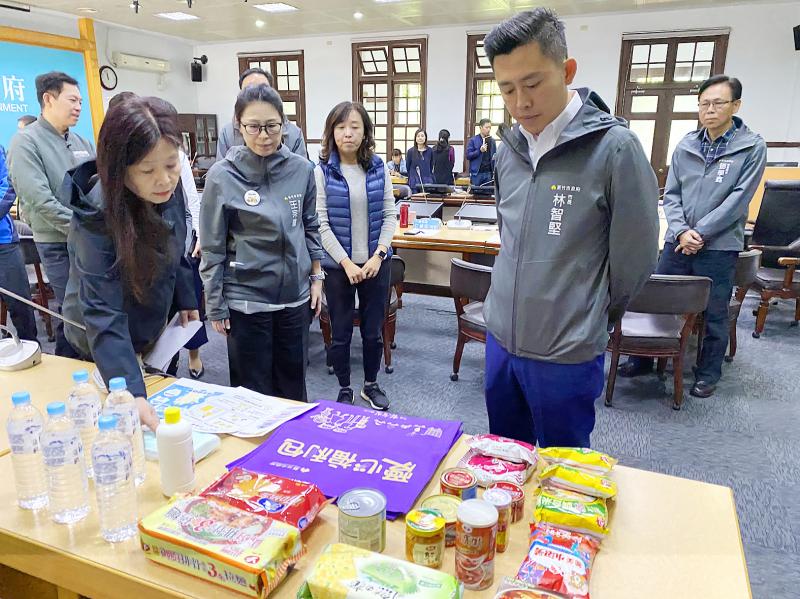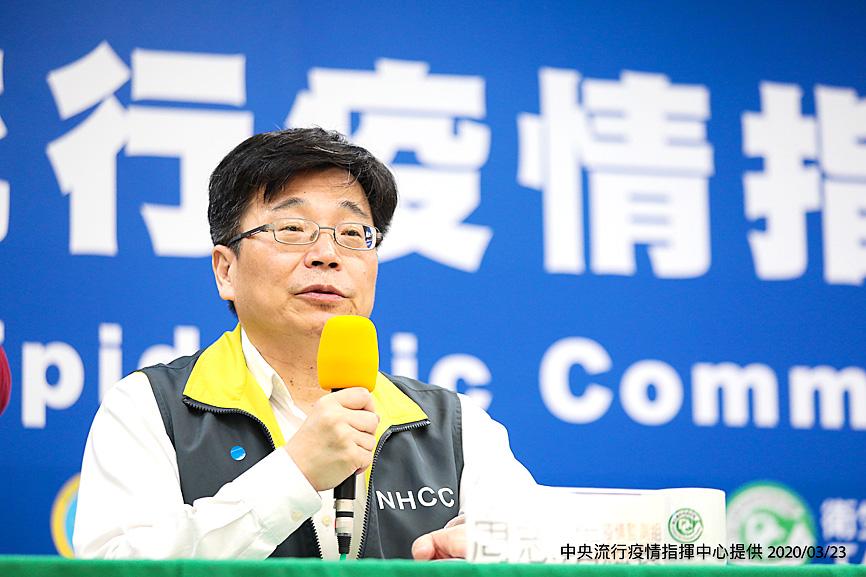Twenty-six new COVID-19 cases were confirmed yesterday, including five clusters, and all but one were imported, bringing Taiwan’s total number to 195, as border controls and home quarantine measures prove their effectiveness, the head of the Central Epidemic Command Center (CECC) said.
Twelve of the new cases were in people tested at airports upon their return, 11 were in people under home quarantine and two were people who tested positive after seeking medical treatment, Minister of Health and Welfare Chen Shih-chung (陳時中), who heads the center, said at its daily news conference.
“The new domestic case is a woman who lives with a Germen researcher at a national research institute who was one of three cases confirmed from the same institute on Sunday, he said.

Photo: Hung Mei-hsiu, Taipei Times
The daily numbers of imported cases have continued to increase since mid-March, and the growth curve is expected to be maintained over the next two weeks,” he said.
Asked why, Chen said the number of travelers returning to Taiwan dropped from about 8,000 people in the middle of this month to more than 3,000 yesterday, but it is likely that more Taiwanese students would return in the coming days, as schools in many nations have been closed, Chen said.
“We are not afraid of an increase in imported cases, as long as we properly conduct airport and home quarantine measures,” he said.

Photo courtesy of the Central Epidemic Command Center
Taiwanese who are overseas should evaluate three factors before deciding to return home — the number of infections where they are, social unrest in that area and the risk of infection during flights — and they should take protective measures if they decide to return, he said.
“They should also be honest in filling in the COVID-19 Health Declaration Form or reporting their travel history and health condition at airport quarantine stations,” he said.
Travelers should report any symptoms they experienced in the previous 14 days, even if they feel better or if they took medicine to alleviate the symptoms, he said.
“We are not punishing people because they took medicine to reduce symptoms, but we will punish people for making false statements on the health declaration form,” he said.
Meanwhile, the number of locally acquired cases remains relatively low, with the sources of infection unclear in only three recent cases, which are under investigation, he said.
The five clusters confirmed yesterday are a married couple who traveled to Spain; two colleagues who traveled to the Netherlands and two family members who traveled with them; a married couple who worked and studied in France; two colleagues who traveled to the US; and a person who traveled to the US with two friends, who were confirmed as being infected on Saturday, he said.
A four-year-old boy who accompanied his parents to the Netherlands is the youngest confirmed case in Taiwan so far, Chen said.
The people among the new imported cases had taken proper self-isolation measures, staying away from those they live with, and so far they had not spread virus into local communities, he said.
Most people have been cooperating with the two lines of defense — airport testing and home quarantines — with just a few exceptions, he added.
Deputy Minister of the Interior Chen Tsung-yen (陳宗彥) said a man under home quarantine after returning from abroad was discovered at a nightclub on Saturday night by police, so the local government fined him the maximum NT$1 million (US$32,889), and he has been placed in a quarantine center.
Police are being deployed at nightclub entrances to check the identity of all those entering, and maximum punishments would be imposed on those who violate home quarantine orders, he said.

NATIONAL SECURITY THREAT: An official said that Guan Guan’s comments had gone beyond the threshold of free speech, as she advocated for the destruction of the ROC China-born media influencer Guan Guan’s (關關) residency permit has been revoked for repeatedly posting pro-China content that threatens national security, the National Immigration Agency said yesterday. Guan Guan has said many controversial things in her videos posted to Douyin (抖音), including “the red flag will soon be painted all over Taiwan” and “Taiwan is an inseparable part of China,” while expressing hope for expedited “reunification.” The agency received multiple reports alleging that Guan Guan had advocated for armed reunification last year. After investigating, the agency last month issued a notice requiring her to appear and account for her actions. Guan Guan appeared as required,

A strong cold air mass is expected to arrive tonight, bringing a change in weather and a drop in temperature, the Central Weather Administration (CWA) said. The coldest time would be early on Thursday morning, with temperatures in some areas dipping as low as 8°C, it said. Daytime highs yesterday were 22°C to 24°C in northern and eastern Taiwan, and about 25°C to 28°C in the central and southern regions, it said. However, nighttime lows would dip to about 15°C to 16°C in central and northern Taiwan as well as the northeast, and 17°C to 19°C elsewhere, it said. Tropical Storm Nokaen, currently

PAPERS, PLEASE: The gang exploited the high value of the passports, selling them at inflated prices to Chinese buyers, who would treat them as ‘invisibility cloaks’ The Yilan District Court has handed four members of a syndicate prison terms ranging from one year and two months to two years and two months for their involvement in a scheme to purchase Taiwanese passports and resell them abroad at a massive markup. A Chinese human smuggling syndicate purchased Taiwanese passports through local criminal networks, exploiting the passports’ visa-free travel privileges to turn a profit of more than 20 times the original price, the court said. Such criminal organizations enable people to impersonate Taiwanese when entering and exiting Taiwan and other countries, undermining social order and the credibility of the nation’s

‘SALAMI-SLICING’: Beijing’s ‘gray zone’ tactics around the Pratas Islands have been slowly intensifying, with the PLA testing Taiwan’s responses and limits, an expert said The Ministry of National Defense yesterday condemned an intrusion by a Chinese drone into the airspace of the Pratas Islands (Dongsha Islands, 東沙群島) as a serious disruption of regional peace. The ministry said it detected the Chinese surveillance and reconnaissance drone entering the southwestern parts of Taiwan’s air defense identification zone early yesterday, and it approached the Pratas Islands at 5:41am. The ministry said it immediately notified the garrison stationed in the area to enhance aerial surveillance and alert levels, and the drone was detected in the islands’ territorial airspace at 5:44am, maintaining an altitude outside the effective range of air-defense weaponry. Following